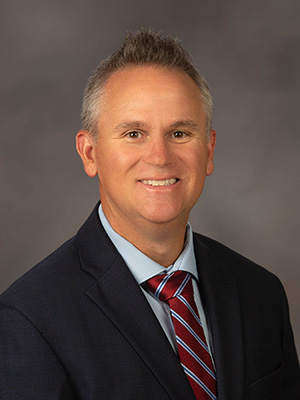Making data work for all among top goals of new DIS hire

Data and analytics have been more than just random numbers on a computer screen for Sandeep Rustagi in his professional life. For him, it’s indeed a passion.
A few weeks into his new role as data analytics officer, Rustagi believes they can indeed be the key to better patient care, more efficient operations and higher student achievement, touching all aspects of the University of Mississippi Medical Center’s mission.

“Data and analytics will provide the pathways for different operational streams to be brought together,” Rustagi said. “That includes clinical, education and research. There’s a lot of potential for us to be optimizing and leveraging resources across those areas, and that would be one of my goals.”
Rustagi began work in August after arriving from Ohio, where he was head of data and, previously, vice president, for a location of Capgemini, a multinational IT services and consulting firm. He also worked for NiSource Inc., as a data/IT transformation executive. In both jobs, he led several strategic data initiatives resolving some of the same challenges he expects to tackle at UMMC.
He holds a PhD in management information systems from the University of Pittsburgh and an MBA in information systems and finance from the Institute of Management Technology in India. His bachelor’s degree in mechanical engineering is from A.M. University in India.
His 20 years of professional data management consulting has shown that data can work for everyone, including health care providers. One daily goal he said he’ll have is the task of maximizing the capabilities of Epic, the Medical Center’s electronic health records management system, and other highly-used applications on the academic and medical sides such as Workday and Canvas. To that end, he plans to help coordinate more education sessions, both live and virtual, for department heads and other leaders across the Medical Center and schools. His vision at UMMC is to establish a robust foundation of data governance to use advanced technologies such as artificial intelligence for achieving significant performance gains.
"What they don’t have in a lot of places today is data-driven decision making,” he said. “Data education is also one of the most foundational things that impact an organization’s performance. So, having all the nice and jazzy tools available is no good to the operational and executive leaders if they aren’t aware of it or don’t know how to use it.”
The end result, he said, will be a benefit to those most often in need of UMMC’s services.
“There’s a lot of opportunities for patients to benefit directly from analytics,” he said. “Forms of artificial intelligence are starting to be used more actively. It will never replace physicians, but it can play a role in helping physicians.
“And the wait times in EDs can be so long, it’s frustrating for the patients and not easy for the staff to deal with that. Patients will benefit directly from using data and analytics to automate and streamline some of those wait times so the availability of beds is clearly shown across departments and patients can move faster,” he said.
Adding his position to those already in place in the Department of Information Systems is part of its reorganization that also aims to better integrate the partnership of analytics, technology and applications, said Kevin Yearick, chief information officer.

“This is a specific role we’ve not had, and with a specific talent,” Yearick said. “Tying it together with IT will allow IT to make faster changes and remove some of the barriers that have existed. We hope to have a greater presence of IT resources across campus to enable transformation for the Medical Center.”
Improved understanding and application of data will help address several issues that challenge health systems, such as wait times, making appointments staffing ratios and grants management. They will get more attention from the position, which in turn will lead to greater engagement between IT and department heads, Yearick said.
“We have this treasure trove of data across the organization, but we’ve not been organized enough to show it,” he said. “We didn’t have the person to give it to our leaders and put it into action.”
Epic, first put into place at UMMC in 2012 and upgraded most recently in 2018, is already a key driver of revenue for the Medical Center but is ripe for refinements, Yearick said.
“Epic gives us the ability to interact with other systems across the U.S. Still, we’re handing out spreadsheets right now as a mechanism to give information instead of using electronic dashboards. Most of the IT systems we have are best in breed, but we don’t use them to their fullest potential,” he said.
The best analogy to put it into perspective, Yearick said, is that of a luxury car with special features seldom used.
“If you’ve got a Cadillac or a Lexus F Sport but only drive it in economy mode, then why did you buy it in the first place? If we continue to drive in economy mode, then we’ll be wasting a lot of the opportunity we have. We want to see the power of these great products in the hands of our surgeons and our research analysts – the folks who are really able to drive us,” he said.


